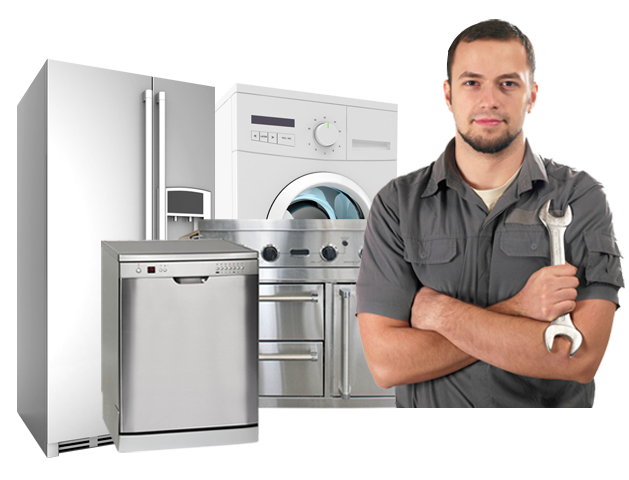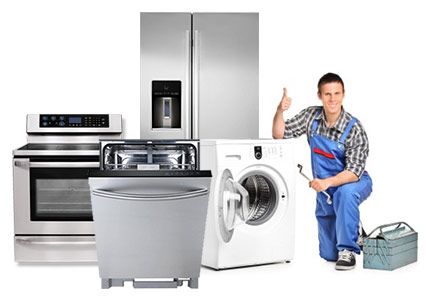The Ultimate Guide to Comprehending Appliance Repair Service in the house
When your fridge stops cooling or your stove refuses to warmth, it can really feel overwhelming. Comprehending home appliance repair work in the house can conserve you money and time. You'll discover to acknowledge symptoms, make use of crucial tools, and comply with a methodical troubleshooting procedure. However prior to you begin, there are essential safety precautions you need to take into account. What are one of the most common problems, and exactly how can you repair them? Allow's check out the fundamentals.
Usual Home Appliance Troubles and Their Signs
When your home appliances start breaking down, it's vital to identify the signs at an early stage. Overlooking them can cause larger issues and costly fixings. If your fridge isn't cooling appropriately, you may notice cozy places or condensation forming. This could suggest a failing compressor or an obstructed vent.Your dishwashing machine may reveal troubles with dirty meals or uncommon noises during cycles. If you listen to grinding or clanking, it's time to investigate.A washing maker that won't spin or drain can leave you with soggy washing, suggesting a blocked drainpipe or a malfunctioning pump.Lastly, if your oven's temperature level appears off or it takes forever to preheat, you could be handling a faulty thermostat. By staying alert to these symptoms, you can deal with issues prior to they rise into significant repairs.
Essential Devices for Device Repair Work
When you're taking on home appliance fixings at home, having the right tools is vital. Basic hand devices like screwdrivers and pliers will certainly aid you disassemble and repair different home appliances, while electrical testing devices ensure you're working safely with circuitry. Let's go over what you require to get going on your repair work journey.
Basic Hand Devices
Having the right devices is crucial for effective device repair work at home. Start with a reliable screwdriver set, including both flathead and Phillips kinds, as screws are usual in appliance assembly. Pliers are likewise essential; they aid with gripping, turning, and reducing cables or little parts. A set of needle-nose pliers can get to tight places easily. You'll need a good adjustable wrench for tightening or loosening nuts and screws. An utility knife comes in handy for cutting through packaging or insulation. Do not forget a strong workbench or surface area to securely organize your tools and components. With these basic hand tools, you'll be well-prepared to take on most home appliance repairs that come your way.
Electrical Testing Instruments
Along with fundamental hand tools, electrical screening devices play a vital role in home appliance repair work. These tools help you detect electrical problems and guarantee home appliances work securely. A multimeter is vital; it measures voltage, current, and resistance, enabling you to determine issues promptly. A non-contact voltage tester is one more must-have, letting you discover live cords without making direct contact, enhancing your safety and security. Clamp meters are great for gauging existing circulation in cables without separating them, conserving you effort and time. In addition, circuit testers can promptly inspect if outlets are functioning correctly. By utilizing these devices, you'll enhance your troubleshooting procedure and improve your fixing abilities, making home appliance upkeep a great deal easier.
Step-by-Step Guide to Diagnosing Device Issues
When your device breaks down, it can be frustrating, however identifying the issue does not need to be frustrating. You'll find out to identify usual issues and use efficient fixing methods. Allow's go through the steps to get your device back in functioning order.
Usual Device Issues

Troubleshooting Techniques Discussed

Fixing Significant Cooking Area Devices: A Closer Look
Have you ever before questioned how to deal with usual problems with your cooking area appliances? Repairing major cooking area home appliances like refrigerators, ovens, and dish washers can be less complicated than you think. Beginning by determining the issue-- whether it's a fridge not cooling or an oven that won't heat up. Usually, a basic reset or examining the source of power can address the issue.For refrigerators, clean the condenser coils and check the door seals. If your stove's not home heating, evaluate the heating element and thermostat. Dishwashers might just need a tidy filter or a reset to obtain them back at work. Constantly disconnect the device before diving right into repair work to ensure your safety.Don' t neglect to seek advice from the individual handbook for certain troubleshooting ideas connected to your model. With a bit of patience and the right tools, you can confidently deal with home appliance fixings and save money in the procedure!

Troubleshooting Laundry Appliances: Tips and Techniques
When your laundry devices start breaking down, it can really feel frustrating, but troubleshooting them does not need to be a trouble. Beginning by checking the power supply. Confirm the device is connected in and the outlet is functioning. Next off, check the door or cover button; a faulty button can stop the machine from operating.For washing machines, if it's not rotating, look for out of balance lots. Rearranging the garments may solve the concern. If your clothes dryer isn't heating, tidy the lint filter and check the read more vent for blockages.Listen for uncommon noises; they can suggest a problem. If your home appliance is leaking, inspect the tubes for cracks or loosened links. Paper any error codes displayed on digital screens, as they can lead you in determining the issue. Lastly, seek advice from the individual guidebook for certain fixing suggestions connected to your version.
Safety Preventative Measures to Take During Repair works
Before you start any home appliance repair work, it's vital to prioritize safety and security to stop crashes or injuries. Disconnect the device or turn off the circuit breaker to guarantee no power reaches it while you work. Usage insulated devices to minimize the threat of electrical shock. Use safety and security goggles and handwear covers to shield yourself from sharp edges or debris (Dependable Refrigeration & Appliance Repair Service Dryer repair near me).Make specific your workspace is neat and well-lit, so you can see what you're doing. Maintain kids and animals away from the location to stay clear of diversions and potential threats. If you're dealing with gas home appliances, be extra careful; look for leakages before proceeding.Take your time, and don't hurry with repairs. If you really feel uncertain concerning any action, it's far better to pause and research than to guess. Adhering to these precautions will certainly aid create a much safer atmosphere for your DIY home appliance fixing project
When to Call an Expert for Aid
Exactly how do you know if it's time to call a specialist for appliance fixings? If you've attempted basic troubleshooting without success, it's a clear indicator. If your device still will not start or shows unusual noises after resetting it, don't be reluctant to look for expert help.When you see leakages, smoke, or melting scents, prioritize security and call a professional quickly. These concerns can bring about even more significant damages or present risks to your home.Also, if your home appliance is under warranty, speaking to an expert is often the best route. They can assure that repair work will not nullify your guarantee, saving you money in the lengthy run.Finally, if you're unsure or uncomfortable with complex repair services, it's sensible to leave it to the professionals. Remember, dealing with difficult concerns without the ideal proficiency can result in pricey mistakes. Count on an expert when in uncertainty!
Often Asked Concerns
Just How Can I Protect Against Device Issues in the Future?
To protect against appliance problems in the future, you should execute regular upkeep, check for damage, tidy filters, and prevent overloading. Remaining proactive will assist prolong their life expectancy and maintain them running smoothly.
What Are the A Lot Of Typical Do It Yourself Device Repair Mistakes?
You might overlook safety precautions, miss troubleshooting actions, or make use of incorrect devices when attempting do it yourself appliance fixings. Hurrying the procedure or neglecting supplier standards can bring about more substantial issues and costly errors. Remain individual and informed!
Exactly how Do I Know if a Part Demands Substitute?
You can inform if a part needs replacement by checking for uncommon sounds, leakages, or irregular efficiency. If the appliance struggles to operate correctly or shows noticeable damages, it's most likely time for a substitute.
Can I Make Use Of Generic Parts for Device Repair Works?
Yes, you can use generic components for device fixings, but establish they work - Lg Dryer repair near me Dependable Refrigeration & Appliance Repair Service. Common parts might save you money, yet they can influence performance or long life, so evaluate your alternatives meticulously prior to making a decision
What Service Warranties Cover Home Appliance Services?
The majority of appliance service warranties cover repair services for producing issues, yet they frequently exclude damage from misuse. Examine your guarantee terms meticulously, as some may need using certified technicians and initial components for protection to remain legitimate.